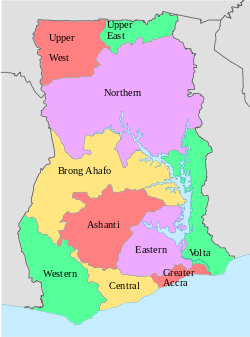Gold Coast (region)
The Gold Coast was the name for a region on the Gulf of Guinea in West Africa that was rich in gold and also in petroleum, sweet crude oil and natural gas. It now forms the country of Ghana.
Gold Coast | |
|---|---|
.jpg) Flag
.svg.png) Gold Coast Emblem
| |
.svg.png) Gold Coast location in red | |
 | |
| Status | The Multinational State of the Republic of Ghana |
| Demonym(s) | Gold Coastian (Ghanaian) |
| Area | |
• Total | 238,535 km2 (92,099 sq mi) |
| Population | |
• Estimate | about 25,366,462[1] |
| Time zone | UTC+0 (GMT) |
| UTC+0 (GMT) | |
| Gold Coast |
|---|
.svg.png) |
|
Etymology and position
The Gold Coast, Slave Coast, Pepper Coast (or Grain Coast) were named after the main export resources there.[2]
Early uses of the term Gold Coast refer literally to the coast and not the interior.[2] It was not until the 19th century that the term came to refer to areas that are far from the coast.[2]
The Gold Coast was to the east of the Ivory Coast and to the west of the Slave Coast.[2]
Territorial entities
Gold Coast region territorial entities were:
- Portuguese Gold Coast (Portuguese)
- Brandenburger Gold Coast and Prussian Gold Coast (Germans)
- Swedish Gold Coast (Swedes)
- Danish Gold Coast (Denmark-Norway)
- Dutch Gold Coast (Dutch)
- British Gold Coast (English)
Ghana is the legal name for the region loosely referred to as the Gold Coast comprising the following four separate parts, which immediately before independence enjoyed distinct constitutional positions:[2]
- the Gold Coast Crown Colony;
- the Ashanti Crown Colony;
- the Northern Territories of the Gold Coast Protectorate; and
- the Trust Territory of Togoland (under British administration).
The United Kingdom government was responsible for shepherding through the Ghana Independence Act 1957 with Charles Arden-Clarke Lord Listowel explained that the name was.chosen "in accordance with the wishes of the Gold Coastian population".[3]
History

Europeans reached this region of Africa in 1482, and for centuries afterwards, various European empires and trading companies set up trading posts, known as factories there. They used these colonies to exploit the resources rather than to settle large numbers of subjects.
The Portuguese Gold Coast was the first claim.[2] The Dutch arrived in 1598 and in 1642 incorporated the Portuguese territory into the Dutch Gold Coast.[2] The Dutch stayed in the region until 1871, when the last of their settlements were taken over by the British Gold Coast.[2]
There was also the Brandenburger Gold Coast, which established a colony in the area in 1682.[2] It later became the Prussian Gold Coast.[2] In 1721 the Dutch purchased it.[2] The Swedish Gold Coast settlements date to 1650. The Danes arrived in 1663 and later seized the Swedish territory and incorporated it into the Danish Gold Coast.[2] [2] In 1850 all of the settlements became part of the British Gold Coast.[2]
In 1774 a London commercial expert references a witness that "the king of Guinea, the greatest city in all the countries of Negroland, has a mass of gold of thirty pounds weight as it was naturally produced in the mines which is completely pure, tough and malleable without having been smelted".[4] The British had taken over all of Gold Coast by 1871.[2] They captured more territory inland in the late 19th century after the Anglo-Ashanti wars.[2] In 1957, the territory comprising the Gold Coast Crown Colony, the Ashanti Crown Colony, the Northern Territories of the Gold Coast Protectorate and British Togoland were united as an independent dominion within the British Commonwealth of Nations under the name Ghana.[2]
See also
References
- "Population Country Economy".
- "The Legislation Providing for the Grant of Independence to Ghana", Journal of African Law, Vol. 1, No. 2 (Summer, 1957, pp. 99–112, Published by Cambridge University Press.
- HC Deb, 11 December 1956, vol. 562 cc229-326, Ghana Independence Bill, The Under-Secretary of State for Commonwealth Relations (Lord John Hope) "First, there is the name "Ghana." This has been conferred on the new country in accordance with local wishes. It was the name of an ancient kingdom, in what is now French territory south of the Sahara, which has acquired great historic significance in the Gold Coast."
- Postlethwayt, Malachy (1774). Universal Dictionary of Trade and Commerce (4th edition). London: W. Strahan, J. & F. Rivington. Volume 1. "Africa".